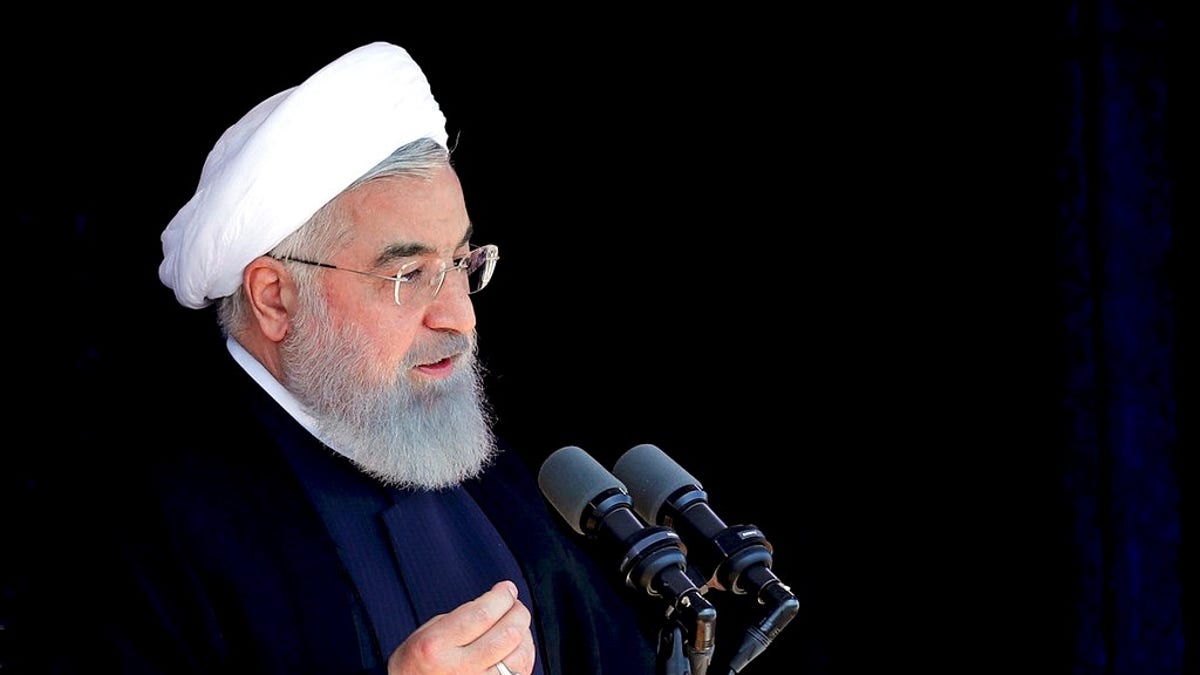
"It really is an unfounded and unfair thing to suggest that one day all oil-producing countries will be able to export oil, while Iran won't be able to do so," said Iranian President Hassan Rouhani. (Iranian Presidency Office via AP)
The usual harassment of U.S. warships by small Iranian gunboats in the Persian Gulf has stopped this year, according to the Navy, but the suspension of such activity could be in jeopardy as Iran threatens to block the Strait of Hormuz.
According to the U.S. Navy’s Fifth Fleet headquartered in Bahrain, these so-called “unsafe and unprofessional” interactions typically took place once a month during President Trump’s first year in office. But there have been no recorded instances of harassment this year.
In then-President Barack Obama’s last year in office, Iranian warships harassed the U.S. Navy about three times a month. These interactions fell by roughly 60 percent in Trump’s first year in office.
The last unsafe interaction occurred nearly a year ago on Aug. 14, 2017, when an Iranian drone flew too close to an F/A-18 Hornet attempting to land aboard the aircraft carrier USS Nimitz, according to the Navy.
Iranian harassment of U.S. warships in Gulf
2015: 22
2016: 36
2017: 14
This year: 0
Source: U.S. Navy
Iranian officials, though, now are threatening to block the Strait of Hormuz, where 30 percent of the world’s oil transits each day in and out of the Persian Gulf — something that could jeopardize the suspension of harassment. This came after a senior U.S. State Department official warned about more sanctions being slapped on the Islamic Republic in November if Iran doesn’t change its behavior.
“Our goal is to increase pressure on the Iranian regime by reducing to zero its revenue from crude oil sales. Now, we are working to minimize disruptions to the global market, but we are confident that there is sufficient global spare oil production capacity,” Brian Hook, director of policy planning at the State Department, said Monday.
Iran’s president responded to Hook a day later, calling such threats overblown.
“In my opinion, what a U.S. official put forward when saying that the United State of America intends to reduce to zero Iranian oil exports, are actually remarks that I think are exaggerated and on a practical level will never be able to be implemented,” Iranian President Hassan Rouhani said alongside his Swiss counterpart in Bern Tuesday.
"The U.S. and its partners provide and promote security and stability in the region. Together, we stand ready to ensure the freedom of navigation and the free flow of commerce wherever international law allows."
“It really is an unfounded and unfair thing to suggest that one day all oil-producing countries will be able to export oil, while Iran won’t be able to do so,” Rouhani added.
Esmail Kowsari, deputy commander of the Sarollah Revolutionary Guards base in Tehran, said: “Any hostile attempt by the U.S. will be followed by an exorbitant cost for them,” according to Bloomberg.
“If Iran’s oil exports are to be prevented, we will not give permission for oil to be exported to the world through the Strait of Hormuz,” Kowsari said.
The head of Iran’s Quds Force, the special operations wing of its Revolutionary Guard, said his forces in Iraq and Syria would be ready to respond if ordered.
“I kiss your (Rouhani’s) hand for expressing such wise and timely comments, and I am at your service to implement any policy that serves the Islamic Republic,” Maj. Gen. Qasem Soleimani said Wednesday.
When asked to comment on Iran’s recent threat, a spokesman for U.S. Central Command responsible for American forces in the Middle East, said the U.S. is ready to respond in kind.
“The U.S. and its partners provide and promote security and stability in the region. Together, we stand ready to ensure the freedom of navigation and the free flow of commerce wherever international law allows,” said Navy Captain Bill Urban.
While the U.S. Navy has warships in the Red Sea and in the Persian Gulf, no American aircraft carrier is nearby.
The USS Harry S. Truman strike group is training with French forces in the Atlantic, and hosted the U.S. ambassador to Paris, Jamie D. McCourt, aboard on July 3, according to a statement from the U.S. Navy.
The amphibious assault ship USS Iwo Jima with dozens of helicopters and jets, along with hundreds of Marines, is in the region, according to the Navy.
Late last week, Trump said he had assurances from Saudi Arabia’s king to boost oil production to make up for any loss of Iranian oil in the global marketplace.
“Just spoke to King Salman of Saudi Arabia and explained to him that, because of the turmoil & dysfunction in Iran and Venezuela, I am asking that Saudi Arabia increase oil production, maybe up to 2,000,000 barrels, to make up the difference...Prices to high! He has agreed!” Trump said in a tweet.
The first unsafe incident of the Trump administration occurred in July 2017 when a U.S. Navy warship fired warning shots at an Iranian gunboat after failing to heed warning signs and approached within 150 yards.
In May, President Trump pulled the United States out of the 2015 landmark nuclear accord with Iran. The State Department says new Iranian sanctions targeting its automotive sector, gold and other metals go into effect next month, and Tehran’s energy sector will be hit with new sanctions in November.




